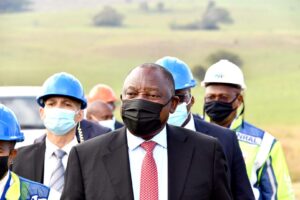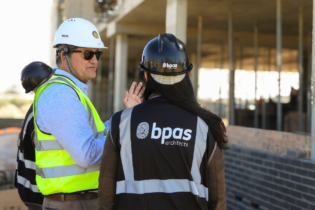President Cyril Ramaphosa says the Welisizwe Rural Bridges Programme remains one of government’s top priorities as these bridges improve the safety, well-being, and access for communities in rural areas.
On Wednesday, the President handed over complete bridges at the rural area of Mkhambathini in KwaZulu-Natal. The Welisizwe Rural Bridges Programme is a result of the objectives announced in the 2023 State of the Nation Address that outlined government’s plan to construct at least 96 bridges during the 2023/24 financial year. Some 11 bridges have been completed in KwaZulu-Natal with at least 58 other bridges currently under construction throughout the country. “Because of climate change, extreme weather events like flooding are becoming increasingly common. Communities living along and close to rivers are particularly vulnerable. That is why we see building more Welisizwe rural bridges as a priority. “The purpose of the programme is to improve safety and well-being for rural communities who have to cross rivers on a daily basis, to boost the local economy by making mobility easier, and to create jobs and support local businesses. “The bridges that have been handed over today will make it easier for communities to get to the clinic and hospital, to school, to town and to places of work. It will make it easier for them to fetch supplies and to take produce to market,” President Ramaphosa said. The President said that during the construction of these bridges, community members benefitted through the Expanded Public Works Programme (EPWP). The EPWP is a medium-to long-term government-funded programme that promotes the use of labour-intensive methods to create work opportunities for poor and unemployed South Africans. “In addition to these workers, each bridge site uses SANDF [South African National Defence Force] engineers and artisans who do work such as welding, groundwork, earth moving and soil retention.“Since its inception, this programme has supported skills development by appointing graduates to work in bridge assessment, project management and maintenance, as assistant engineers and as candidate construction project managers.
“The bridge components are all locally sourced from South African companies that specialise in the manufacture and supply of steel-modular type bridges. Local suppliers have also benefitted through the supply of materials such as stones, cement, concrete, road sign paint and personal protective equipment,” he said. Historical mission The President reflected that since the dawn of democracy some 30 years ago, government has built bridges “as we work to overcome the divisions of the past”. “Over centuries of colonialism and decades of apartheid, the needs of the majority of South Africans were deliberately neglected, especially in our rural communities. Infrastructure was built for the benefit of a privileged minority. “The historical lack of infrastructure in black communities contributed to the deep levels of poverty and inequality that we continue to grapple with today. We remain determined to correct the imbalances in infrastructure.” He urged community members to protect the bridges from vandalism and destruction. “It is time to build bridges, not to destroy or burn them. It is time to build together a South Africa that we will be proud to leave for future generations. “Today, the children of these areas can safely cross flooded rivers and attend school. Today, our grandparents can safely travel to health care facilities or to access government services,” President Ramaphosa concluded.






